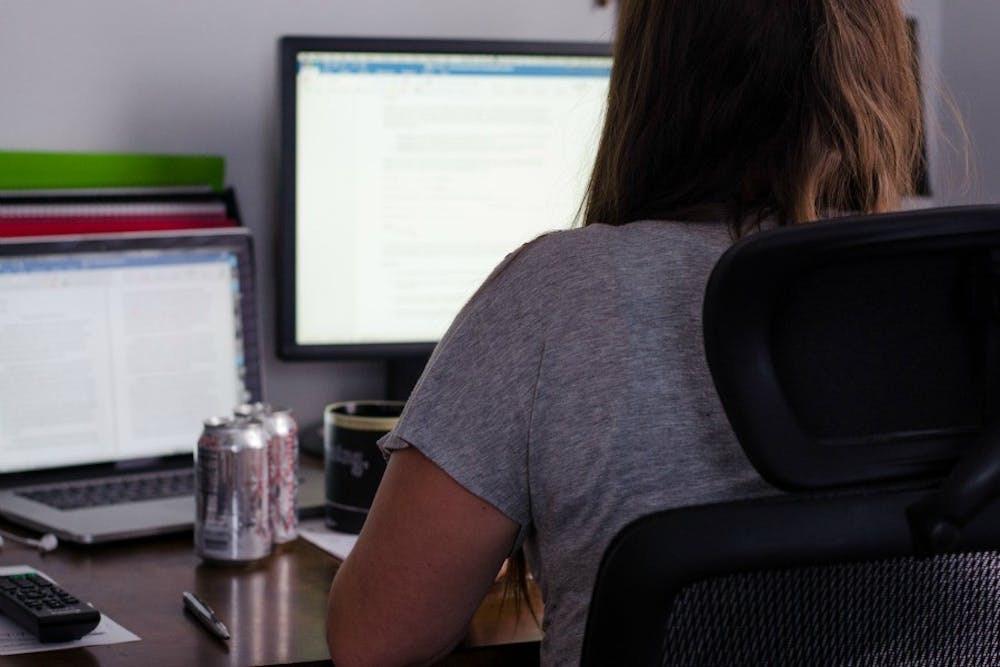By Morgan Nguyen, For The Miami Student
Class, class, meeting, lunch, office hours, class - it seems like the normal daily routine. However, there's a link between these different activities that some experts argue could be deadly: all involve excessive sitting.
Sitting is so integrated into social order that it is an unconscious action, though its effects may become all too evident.
According to the Mayo Clinic, sitting has been linked to a host of medical concerns, including obesity and metabolic syndrome.
Metabolic syndrome is a collection of conditions, including increased blood pressure, high blood sugar, excess belly fat and abnormally high cholesterol levels.
"I think that it's really easy to sit at your desk and not notice how much time you have actually spent sitting down," said sophomore Olivia Callahan. "I know that I myself have sat down to work on some homework and looked at the clock only to realize I've been in the same spot for five hours."
Callahan believes too much sitting can indeed be unhealthy, especially when paired with snacking.
According to a report published in the January 2015 Annals of Internal Medicine, more than half of the average person's waking hours are spent sitting: watching television, working at a computer, commuting by car or bus, etc.
"We don't see sitting as an intrinsically unhealthy thing to do," said senior Rob Purgert, president of Phi Delta Epsilon Medical Fraternity. "Yet, when you think about the fact that thousands of years of evolution built our bodies to account for long periods of standing and moving, it is easy to see you spending all day sitting is actually 'unnatural.'"
The Rec Center on campus combats "all day sitting" by taking advantage of standing desks to improve health for its employees at work.
"We started standing desks here because my husband started using one when he worked here and I thought it was a great idea," said Tara Britton, director of customer service and sponsorships at the Rec. "When I started using it, I noticed within just a few days my posture was improved, and I was more active in moving throughout the day. It also allows for me to focus on my work as opposed to my aching neck and back."
Britton added that standing desks at the reception and Pro Shop areas help staff interact better with patrons and move around their workspace more easily.
"Overall, we believe standing work stations have been a great addition to our health, both mentally and physically," Britton said. "One good, healthy decision each day leads to another."
Professionals affirm the benefit of standing and moving in the work place. Alan Hedge, professor of ergonomics at Cornell University, recommends that for every 30 minutes spent at a desk, people should sit for 20 minutes, stand for eight and then move around and stretch for two.
Other options to increase activity throughout the day include investing in a standing desk, walking while doing errands, and holding meetings while walking instead of sitting around a table. Students can consider walking to class instead of driving or going on a run to the grocery store and doing weight lifts with the bags on the way back.
Running an extra mile at the gym isn't necessarily the cure-all.
Research has shown that even regular exercise cannot compensate for the effects of sitting too much throughout the day. This is because sitting causes physiological changes in the body. The solution is even simpler than going for a run - just stand. Standing activates muscles so excess amounts of blood glucose are absorbed in the muscle instead of fat, according to the University of Chester.
The little habits seem to add up, as evidenced in multiple studies and the opinion of students.
"I think it is important to focus on little ways that we can reduce sitting time," Purgert said. "For example, walking to class instead of driving, or pacing around your room while talking on the phone, if you can change little habits throughout your day, you can soon find yourself taking on a whole new lifestyle."

